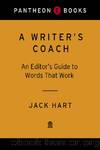A Writer's Coach by Jack R. Hart

Author:Jack R. Hart [Hart, Jack R.]
Language: eng
Format: epub
Publisher: Knopf Doubleday Publishing Group
Published: 2006-08-22T05:00:00+00:00
CHAPTER 7
RHYTHM
Writers are in the music business.
âDon Murray
The Music in the Words
Fiesta celebrants gather around a mariachi band in a Jalisco village square. Angelinos cluster around a jazz combo on Santa Monicaâs Third Street Mall. Oktoberfest revelers follow an oompah band pounding away in a Munich park. The magnetism of rhythm can draw an audience anywhere.
But rhythmâs primal appeal reaches far beyond its most obvious manifestations in music. A pleasing fabric design has its own kind of rhythm. So does the chirp of a cricket, the beat of waves breaking on a beach, and patterns of human language, written as well as spoken. Words can be appealing for the beat they produce, regardless of content.
How often do we find ourselves reading something with no possible application to our own lives? A die-hard urbanite reads an article on sagebrush, or a rancher gets caught up in an essay on New York rent control. If the words flow lyrically, they attract and hold our attention.
Language that lasts almost always resounds with deeply appealing rhythms. In The Elements of Style, William Strunk and E. B. White illustrate the power of rhythmic writing by referring to The Crisis, Tom Paineâs classic Revolutionary War essay. The Crisis sold more copies per capita than any other commercial publication ever printed in the United States. It is best remembered for its most lyrical line: âThese are the times that try menâs souls.â
Thatâs a masterpiece of syncopation. The t sounds cycle through the words in perfect counterpoint to the s sounds. The syllables collect in beautifully balanced groups. The sentence rolls off the tongue with the appeal of waves breaking on a beach.
But, as Strunk and White point out, Paine could have easily botched the job. Who would have remembered âHow trying it is to live in these timesâ? Or âTimes like these try menâs soulsâ? Or, worst of all, âSoulwise, these are trying timesâ?
Prove the point yourself by juggling a few other memorable lines. Would we remember âThe early bird gets the wormâ if Poor Richard had written âThe worm is gotten by the early birdâ? Would a simple injunction to âbe selfless and patrioticâ have inspired Americans in the same way as John Kennedyâs appeal that you âask not what your country can do for you; ask what you can do for your countryâ?
Despite its obvious value, some editors ignore rhythm as they strive to enhance accuracy, precision, and brevity. If youâre a writer who chooses the word âkidâ because it makes just the right sound in just the right place, and your editor changes it to âyoungster,â itâs time to talk. Editors need to know if you have particular rhythms in mind so that they donât disrupt them with changes aimed at improving other aspects of your writing. A responsible editor will honor a writerâs intended rhythms if he can.
Whatever you do, donât let tin-eared editing persuade you to give up your quest for pleasing cadences. Seductively rhythmic writing can add value that often transcends content.
Download
This site does not store any files on its server. We only index and link to content provided by other sites. Please contact the content providers to delete copyright contents if any and email us, we'll remove relevant links or contents immediately.
Twisted Games: A Forbidden Royal Bodyguard Romance by Ana Huang(2544)
The Push by Ashley Audrain(2259)
Den of Vipers by K.A Knight(2184)
Win by Harlan Coben(2063)
Echo by Seven Rue(1884)
Leave the World Behind by Rumaan Alam(1714)
Beautiful World, Where Are You: A Novel by Sally Rooney(1618)
Midnight Mass by Sierra Simone(1582)
Iron Widow by Xiran Jay Zhao(1477)
The Four Winds by Hannah Kristin(1461)
Baby Bird by Seven Rue(1419)
Undercover Threat by Sharon Dunn(1405)
The Warrior's Princess Prize by Carol Townend(1405)
Bridgertons 2.5: The Viscount Who Loved Me [Epilogue] by Julia Quinn(1397)
Sister Fidelma 07 - The Monk Who Vanished by Peter Tremayne(1342)
Snowflakes by Ruth Ware(1236)
Vanessa Yu's Magical Paris Tea Shop by Roselle Lim(1219)
The Golden Cage by Camilla Lackberg(1186)
The Midwife Murders by James Patterson(1149)
